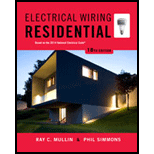
Electrical Wiring Residential
18th Edition
ISBN: 9781285170954
Author: Ray C. Mullin, Phil Simmons
Publisher: Cengage Learning
expand_more
expand_more
format_list_bulleted
Concept explainers
Question
Chapter 1, Problem 25R
To determine
Convert
Expert Solution & Answer
Want to see the full answer?
Check out a sample textbook solution
Students have asked these similar questions
P7.2
The capacitors in the circuit shown below have no energy stored in them and then switch "A"
closes at time t=0. Switch "B" closes 2.5 milliseconds later. Find v(t) across the 6 μF
capacitor for t≥ 0.
500 Ω
B
4 µF
20 V
6 µF 7
Σ2 ΚΩ
25 mA
+
· με
Q1: If x[n] is a discrete signal and represented by the following
equation, what is the value of x[0] and X[-2]
Q2:
{x[n]}={-0.2,2.2,1.1,0.2,-3.7,2.9,...}
a- Assuming that a 5-bit ADC channel accepts analog input ranging
from 0 to 4 volts, determine the following:
1- number of quantization levels;
2-step size of the quantizer or resolution;
3- quantization level when the analog voltage is 1.28 volts.
4- binary code produced by the ADC.
5- quantization error.
b- Determine whether the linear system is time invariant or not?
1 1
y(n) = x(n)
Q3: Evaluate the digital convolution of the following signals using
Graphical method. Find: y(0) to y(3)
Q4:
2, k = 0,1,2
2, k = 0
h(k)
0
1, k = 3,4 and x(k)
elsewhere
=
1,
k = 1,2
0
elsewhere
The temperature (in Kelvin) of an electronic component can be
modelled using the following approximation:
T(t) [293+15e-Ju(t)
A digital thermometer is used to periodically record the component's
temperature, taking a sample every 5 seconds.
1- Represent the…
I need solution by hand clearly
Chapter 1 Solutions
Electrical Wiring Residential
Ch. 1 - What is the purpose of specifications?Ch. 1 - Refer to the specifications in the back of this...Ch. 1 - What is done to prevent a plan from becoming...Ch. 1 - Name three requirements contained in the...Ch. 1 - Prob. 5RCh. 1 - What phrase is used when a substitution is...Ch. 1 - What is the purpose of an electrical symbol?...Ch. 1 - Prob. 8RCh. 1 - Prob. 9RCh. 1 - What three parties must be satisfied with the...
Ch. 1 - Prob. 12RCh. 1 - Prob. 13RCh. 1 - Does the NEC provide minimum or maximum standards?...Ch. 1 - What do the letters UL signify?Ch. 1 - What section of the NEC states that all listed or...Ch. 1 - Prob. 17RCh. 1 - Prob. 18RCh. 1 - Does compliance with the NEC always result in an...Ch. 1 - Name two nationally recognized testing...Ch. 1 - Prob. 21RCh. 1 - Prob. 23RCh. 1 - A junction box on a piece of European equipment is...Ch. 1 - Prob. 25RCh. 1 - You will learn in Chapter 3 that residential...Ch. 1 - Prob. 27RCh. 1 - What can you do to reduce or eliminate the...Ch. 1 - What is the NEC definition of a qualified person?Ch. 1 - Are low-voltage systems totally safe? Explain.Ch. 1 - Prob. 32RCh. 1 - What do the letters PPE stand for?...Ch. 1 - Prob. 34RCh. 1 - Where might you obtain information about...Ch. 1 - Prob. 36R
Knowledge Booster
Learn more about
Need a deep-dive on the concept behind this application? Look no further. Learn more about this topic, electrical-engineering and related others by exploring similar questions and additional content below.Similar questions
- fin D Q Point 7.57 in Matlab Aarrow_forwardFor the following graphical figure, write the function x(n) and h(n) in: 1. sequential vector 2. functional representation 3. Tabular 2 h0) 32 If signal x(n)-(32130 104032)], describe this signal using: 1. Graphical representation 2. Tabular representation 3. Write its expression 4. Write it as equation 5. Draw it as y(n) - x(n) u(n-3) 6. Sketch it if it is bounded at -2arrow_forwardFor the following Split-phase Manchester waveform, extract the original binary data. Then draw the AMI code for that data. 0arrow_forward1 ΚΩ N₁ m ZL (10+j4) ks2 178/0° V N2 -202 Ω Figure P11.31 Circuit for Problem 11.31.arrow_forwardCari induktasi saluran transmisi terhadapku GMDarrow_forwardA wattmeter is connected with the positive lead on phase “a” of a three-phase system. The negative lead is connected to phase “b”. A separate wattmeter has the positive lead connected to phase “c”. The negative lead of this wattmeter is connected also to phase “b”. If the input voltage is 208 volts line-to-line, the phase sequence is “abc” and the load is 1200 ohm resistors connected in “Y”, what is the expected reading of each of the wattmeters? (Hint: draw a phasor diagram)arrow_forwarda b 1 ΚΩΣ 56002 82092 470Ω Rab, Rbc, Rde d e O 470Ω Σ 5 Ω 25$ 5602 3 4 Ωarrow_forwardMY code is experiencing a problem as I want to show both the magnitude ratio on low pass, high pass, and bandbass based on passive filters: Code: % Define frequency range for the plot f = logspace(1, 5, 500); % Frequency range from 10 Hz to 100 kHz w = 2*pi*f; % Angular frequency % Parameters for the filters (you can modify these) R = 1e3; % Resistance in ohms (1 kOhm) C = 1e-6; % Capacitance in farads (1 uF) L = 10e-3; % Inductance in henries (10 mH) % Transfer function for Low-pass filter: H_low = 1 / (1 + jωRC) H_low = 1 ./ (1 + 1i*w*R*C); % Transfer function for High-pass filter: H_high = jωRC / (1 + jωRC) H_high = 1i*w*R*C ./ (1 + 1i*w*R*C); % Transfer function for Band-pass filter: H_band = jωRC / (1 + jωL/R + jωRC) H_band = 1i*w*R*C ./ (1 + 1i*w*L/R + 1i*w*R*C); % Plot magnitude responses figure; subplot(3,1,1); semilogx(f, 20*log10(abs(H_low))); % Low-pass filter title('Magnitude Response of Low-pass Filter'); xlabel('Frequency (Hz)'); ylabel('Magnitude (dB)'); grid…arrow_forward*10. For the network of Fig. 7.83, determine: a. Ip. b. VDS. c. VD. d. Vs. 20 V 2.2 ΚΩ ID -4 V IDSS = 4.5 mA VDS Vp = -5V 0.68 ΚΩarrow_forwardarrow_back_iosSEE MORE QUESTIONSarrow_forward_ios
Recommended textbooks for you
 EBK ELECTRICAL WIRING RESIDENTIALElectrical EngineeringISBN:9781337516549Author:SimmonsPublisher:CENGAGE LEARNING - CONSIGNMENT
EBK ELECTRICAL WIRING RESIDENTIALElectrical EngineeringISBN:9781337516549Author:SimmonsPublisher:CENGAGE LEARNING - CONSIGNMENT

EBK ELECTRICAL WIRING RESIDENTIAL
Electrical Engineering
ISBN:9781337516549
Author:Simmons
Publisher:CENGAGE LEARNING - CONSIGNMENT